剑桥雅思5Test3阅读Passage1答案解析
- 格式:doc
- 大小:13.00 KB
- 文档页数:2
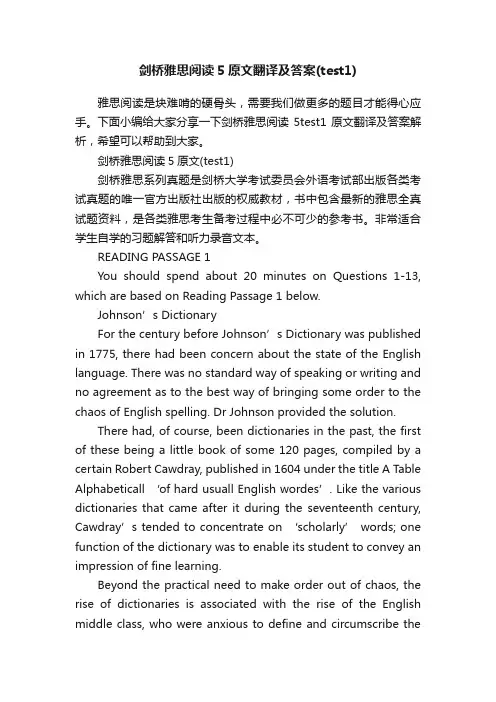
剑桥雅思阅读5原文翻译及答案(test1)雅思阅读是块难啃的硬骨头,需要我们做更多的题目才能得心应手。
下面小编给大家分享一下剑桥雅思阅读5test1原文翻译及答案解析,希望可以帮助到大家。
剑桥雅思阅读5原文(test1)剑桥雅思系列真题是剑桥大学考试委员会外语考试部出版各类考试真题的唯一官方出版社出版的权威教材,书中包含最新的雅思全真试题资料,是各类雅思考生备考过程中必不可少的参考书。
非常适合学生自学的习题解答和听力录音文本。
READING PASSAGE 1You should spend about 20 minutes on Questions 1-13, which are based on Reading Passage 1 below.Johnson’s DictionaryFor the centur y before Johnson’s Dictionary was published in 1775, there had been concern about the state of the English language. There was no standard way of speaking or writing and no agreement as to the best way of bringing some order to the chaos of English spelling. Dr Johnson provided the solution.There had, of course, been dictionaries in the past, the first of these being a little book of some 120 pages, compiled by a certain Robert Cawdray, published in 1604 under the title A Table Alphabeticall ‘of hard usuall English wordes’. Like the various dictionaries that came after it during the seventeenth century, Cawdray’s tended to concentrate on ‘scholarly’ words; one function of the dictionary was to enable its student to convey an impression of fine learning.Beyond the practical need to make order out of chaos, the rise of dictionaries is associated with the rise of the English middle class, who were anxious to define and circumscribe thevarious worlds to conquer —lexical as well as social and commercial. it is highly appropriate that Dr Samuel Johnson, the very model of an eighteenth-century literary man, as famous in his own time as in ours, should have published his Dictionary at the very beginning of the heyday of the middle class.Johnson was a poet and critic who raised common sense to the heights of genius. His approach to the problems that had worried writers throughout the late seventeenth and early eighteenth centuries was intensely practical. Up until his time, the task of producing a dictionary on such a large scale had seemed impossible without the establishment of an academy to make decisions about right and wrong usage. Johnson decided he did not need an academy to settle arguments about language; he would write a dictionary himself and he would do it single-handed. Johnson signed the contract for the Dictionary with the bookseller Robert Dosley at a breakfast held at the Golden Anchor Inn near Holbom Bar on 18 June 1764.He was to be paid £1.575 in instalments, and from this he took money to rent Gou gh Square, in which he set up his ‘dictionary workshop’.James Boswell, his biographer, described the garret where Johnson worked as ‘fitted up like a counting house’ with a long desk running down the middle at which the copying clerks would work standing up. Johnson himself was stationed on a rickety chair at an ‘old crazy deal table’ surrounded by a chaos of borrowed books. He was also helped by six assistants, two of whom died whilst the Dictionary was still in preparation.The work was immense; filling about eighty large notebooks (and without a library to hand), Johnson wrote the definitions of over 40,000 words, and illustrated their many meanings with some 114,000 quotations drawn from English writing on everysubject, from the Elizabethans to his own time. He did not expect to achieve complete originality. Working to a deadline, he had to draw on the best of all previous dictionaries, and to make his work one of heroic synthesis. In fact, it was very much more. Unlike his predecessors, Johnson treated English very practically, as a living language, with many different shades of meaning. He adopted his definitions on the principle of English common law —according to precedent. After its publication, his Dictionary was not seriously rivalled for over a century.After many vicissitudes the Dictionary was finally published on 15 April 1775. It was instantly recognised as a landmark throughout Europe. ‘This very noble work,’ wrote the leading Italian lexicographer, ‘will be a perpetual monument of Fame to the Author, an Honour to his own Country in particular, and a general Benefit to the republic of Letters throughout Europe" The fact that Johnson had taken on the Academies of Europe and matched them (everyone knew that forty French academics had taken forty years to produce the first French national dictionary) was cause for much English celebration.Johnson had worked for nine years, ‘with little assistance of the learned, and without any patronage of the great; not in the soft obscurities of retirement, or under the shelter of academic bowers, but amidst inconvenience and distraction, in sickness and in sorrow’. For all its faults and eccentricities his two-volume work is a masterpiece and a landmark, in his own words, ‘setting the orthography, displaying the analogy, regulating the structures, and ascertaining the significations of English words’. It is the cornerstone of Standard English an achievement which, in James Boswell’s words ‘conferred stability on the language of his country.’The Dictionary, together with his other writing, made Johnson famous and so well esteemed that his friends were able to prevail upon King George Ⅲ to offer him a pension. From then on, he was to become the Johnson of folklore.Questions 1-3Choose THREE letters A-H.Write your answers in boxes 1-3 on your answer sheet.NB Your answers may be given in any order.Which THREE of the following statements are true of Johnson’s Dictionary?A It avoided all scholarly words.B It was the only English dictionary in general use for 200 years.C It was famous because of the large number of people involved.D It focused mainly on language from contemporary texts.E There was a time limit for its completion.F It ignored work done by previous dictionary writers.G It took into account subtleties of meaning.H Its definitions were famous for their originality.Questions 4-7Complete the summary.Choose NO MORE THAN TWO WORDS from the passage for each answer.Write your answers in boxes 4-7 on your answer sheet.In 1764 Dr Johnson accepted the contract to produce a dictionary. Having rented a garret, he took on a number of 4…………, who stood at a long central desk. Johnson did not have a 5………… available to him, but eventually produced definitions of in excess of 40,000 words written down in 80 large notebooks.On publications, the Dictionary was immediately hailed in many European countries as a landmark. According to his biographer, James Boswell, Johnson’s principal achievement was to bring 6……… to the English language. As a reward for his ha rd work, he was granted a 7………by the king.Questions 8-13Do the following statements agree with the information given in Reading Passage 1?In boxes 8-13 on your answer sheet, writeTRUE if the statement agrees with the informationFALSE if the statement contradicts the informationNOT GIVEN if there is no information on this8 The growing importance of the middle classes led to an increased demand for dictionaries.9 Johnson has become more well known since his death.10 Johnson had been planning to write a dictionary for several years.11 Johnson set up an academy to help with the writing of his Dictionary.12 Johnson only received payment for his Dictionary on its completion.13 Not all of the assistants survived to see the publication of the Dictionary.READING PASSAGE 2You should spend about 20 minutes on Questions 14-26, which are based on Reading Passage 2 below.Nature or Nurture?A A few years ago, in one of the most fascinating and disturbing experiments in behavioural psychology, Stanley Milgram of Yale University tested 40 subjects from all walks of lifefor their willingness to obey instructions given by a ‘leader’ in a situation in which the subjects might feel a personal distaste for the actions they were called upon to perform. Specifically M ilgram told each volunteer ‘teacher-subject’ that the experiment was in the noble cause of education, and was designed to test whether or not punishing pupils for their mistakes would have a positive effect on the pupils’ ability to learn.B Milgram’s expe rimental set-up involved placing the teacher-subject before a panel of thirty switches with labels ranging from ‘15 volts of electricity (slight shock)’ to ‘450 volts (danger —severe shock)’ in steps of 15 volts each. The teacher-subject was told that whenever the pupil gave the wrong answer to a question, a shock was to be administered, beginning at the lowest level and increasing in severity with each successive wrong answer. The supposed ‘pupil’ was in reality an actor hired by Milgram to simulate receiving the shocks by emitting a spectrum of groans, screams and writings together with an assortment of statements and expletives denouncing both the experiment and the experimenter. Milgram told the teacher-subject to ignore the reactions of the pupil, and to administer whatever level of shock was called for, as per the rule governing the experimental situation of the moment.C As the experiment unfolded, the pupil would deliberately give the wrong answers to questions posed by the teacher, thereby bringing on various electrical punishments, even up to the danger level of 300 volts and beyond. Many of the teacher-subjects balked at administering the higher levels of punishment, and turned to Milgram with questioning looks and/or complaints about continuing the experiment. In these situations, Milgramcalmly explained that the teacher-subject was to ignore the pupil’s cries for mercy and carry on with the experiment. If the subject was still reluctant to proceed, Milgram said that it was important for the sake of the experiment that the procedure be followed through to the end. His final argument was ‘you have no other choice. You must go on’. What Milgram was trying to discover was the number of teacher-subjects who would be willing to administer the highest levels of shock, even in the face of strong personal and moral revulsion against the rules and conditions of the experiment.D Prior to carrying out the experiment, Milgram explained his idea to a group of 39 psychiatrists and asked them to predict the average percentage of people in an ordinary population who would be willing to administer the highest shock level of 450 volts. The overwhelming consensus was that virtually all the teacher-subjects would refuse to obey the experimenter. The psychiatrists felt that ‘most subjects would not go beyond 150 volts’ and they further anticipated that only four per cent would go up to 300 volts. Furthermore, they thought that only a lunatic fringe of about one in 1,000 would give the highest shock of 450 volts.E What were the actual results? Well, over 60 per cent of the teacher-subjects continued to obey Milgram up to the 450-volt limit in repetitions of the experiment in other countries, the percentage of obedient teacher-subjects was even higher, reaching 85 per cent in one country. How can we possibly account for this vast discrepancy between what calm, rational, knowledgeable people predict in the comfort of their study and what pressured, flustered, but cooperative ‘teachers’ actually do in the laboratory of real life?F One’s first inclination might be to argue that there must be some sort of built-in animal aggression instinct that was activated by the experiment, and that Milgram’s teache-subjects were just following a genetic need to discharge this pent-up primal urge onto the pupil by administering the electrical shock. A modern hard-core sociobiologist might even go so far as to claim that this aggressive instinct evolved as an advantageous trait, having been of survival value to our ancestors in their struggle against the hardships of life on the plains and in the caves, ultimately finding its way into our genetic make-up as a remnant of our ancient animal ways.G An alternative to this notion of genetic programming is to see the teacher-subjects’ actions as a result of the social environment under which the experiment was carried out. As Milgram himself pointed out, ‘Most subjects in the experiment see their behaviour in a larger context that is benevolent and useful to society —the pursuit of scientific truth. The psychological laboratory has a strong claim to legitimacy and evokes trust and confidence in those who perform there. An action such as shocking a victim, which in isolation appears evil, acquires a completely different meaning when placed in this se tting.’H Thus, in this explanation the subject merges his unique personality and personal and moral code with that of larger institutional structures, surrendering individual properties like loyalty, self-sacrifice and discipline to the service of malevolent systems of authority.I Here we have two radically different explanations for why so many teacher-subjects were willing to forgo their sense of personal responsibility for the sake of an institutional authorityfigure. The problem for biologists, psychologists and anthropologists is to sort out which of these two polar explanations is more plausible. This, in essence, is the problem of modern sociobiology — to discover the degree to which hard-wired genetic programming dictates, or at least strongly biases, the interaction of animals and humans with their environment, that is, their behaviour. Put another way, sociobiology is concerned with elucidating the biological basis of all behaviour.Questions 14-19Reading Passage 2 has nine paragraphs, A-I.Which paragraph contains the following information?Write the correct letter A-I in boxes 14-19 on your answer sheet.14 a biological explanation of the teacher-subjects’ behaviour15 the explanation Milgram gave the teacher-subjects for the experiment16 the identity of the pupils17 the expected statistical outcome18 the general aim of sociobiological study19 the way Milgram persuaded the teacher-subjects to continueQuestions 20-22Choose the correct letter, A, B, C or D.Write your answers in boxes 20-22 on your answer sheet.20 The teacher-subjects were told that were testing whetherA a 450-volt shock was dangerous.B punishment helps learning.C the pupils were honest.D they were suited to teaching.21 The teacher-subjects were instructed toA stop when a pupil asked them to.B denounce pupils who made mistakes.C reduce the shock level after a correct answer.D give punishment according to a rule.22 Before the experiment took place the psychiatristsA believed that a shock of 150 volts was too dangerous.B failed to agree on how the teacher-subjects would respond to instructions.C underestimated the teacher-subjects’ willingness to comply with experimental procedure.D thought that many of the teacher-subjects would administer a shock of 450 volts.Questions 23-26Do the following statements agree with the information given in Reading Passage 2?In boxes 23-26 on your answer sheet, writeTRUE if the statement agrees with the informationFALSE if the statement contradicts the informationNOT GIVEN if there is no information on this23 Several of the subjects were psychology students at Yale University.24 Some people may believe that the teacher-subjects’ behaviour could be explained as a positive survival mechanism.25 In a sociological explanation, personal values are more powerful than authority.26 Milgram’s experiment solves an important question in sociobiology.READING PASSAGE 3You should spend about 20 minutes on Questions 27-40,which are based on Reading Passage 3 below.The Truth about the EnvironmentFor many environmentalists, the world seems to be getting worse. They have developed a hit-list of our main fears: that natural resources are running out; that the population is ever growing, leaving less and less to eat; that species are becoming extinct in vast numbers, and that the planet’s air and water are becoming ever more polluted.But a quick look at the facts shows a different picture. First, energy and other natural resources have become more abundant, not less so, since the book ‘The Limits to Growth’ was published in 1972 by a group of scientists. Second, more food is now produced per head of the world’s population than at any time in history. Fewer people are starving. Third, although species are indeed becoming extinct, only about 0.7% of them are expected to disappear in the next 50 years, not 25-50%, as has so often been predicted. And finally, most forms of environmental pollution either appear to have been exaggerated, or are transient —associated with the early phases of industrialisation and therefore best cured not by restricting economic growth, but by accelerating it. One form of pollution — the release of greenhouse gases that causes global warming — does appear to be a phenomenon that is going to extend well into our future, but its total impact is unlikely to pose a devastating problem. A bigger problem may well turn out to be an inappropriate response to it.Yet opinion polls suggest that many people nurture the belief that environmental standards are declining and four factors seem to cause this disjunction between perception and reality.One is the lopsidedness built into scientific research. Scientific funding goes mainly to areas with many problems. That may be wise policy, but it will also create an impression that many more potential problems exist than is the case.Secondly, environmental groups need to be noticed by the mass media. They also need to keep the money rolling in. Understandably, perhaps, they sometimes overstate their arguments. In 1997, for example, the World Wide Fund for Nature issued a press release entitled: ‘Two thirds of the world’s forests lost forever.’ The truth turns out to be nearer 20%.Though these groups are run overwhelmingly by selfless folk, they nevertheless share many of the characteristics of other lobby groups. That would matter less if people applied the same degree of scepticism to environmental lobbying as they do to lobby groups in other fields. A trade organisation arguing for, say, weaker pollution controls is instantly seen as self-interested. Yet a green organisation opposing such a weakening is seen as altruistic, even if an impartial view of the controls in question might suggest they are doing more harm than good.A third source of confusion is the attitude of the media. People are clearly more curious about bad news than good. Newspapers and broadcasters are there to provide what the public wants. That, however, can lead to significant distortions of perception. An example was America’s encounter with El Nino in 1997 and 1998. This climatic phenomenon was accused of wrecking tourism, causing allergies, melting the ski-slopes and causing 22 deaths. However, according to an article in the Bulletin of the American Meteorological Society, the damage it did was estimated at US$4 billion but the benefits amounted to some US$19 billion. These came from higher winter temperatures(which saved an estimated 850 lives, reduced heating costs and diminished spring floods caused by meltwaters).The fourth factor is poor individual perception. People worry that the endless rise in the amount of stuff everyone throws away will cause the world to run out of places to dispose of waste. Yet, even if America’s trash output continues to rise as it has done in the past, and even if the American population doubles by 2100, all the rubbish America produces through the entire 21st century will still take up only one-12,000th of the area of the entire United States.So what of global warming? As we know, carbon dioxide emissions are causing the planet to warm. The best estimates are that the temperatures will rise by 2-3℃ in this century, causing considerable problems, at a total cost of US$5,000 billion.Despite the intuition that something drastic needs to be done about such a costly problem, economic analyses clearly show it will be far more expensive to cut carbon dioxide emissions radically than to pay the costs of adaptation to the increased temperatures. A model by one of the main authors of the United Nations Climate Change Panel shows how an expected temperature increase of 2.1 degrees in 2100 would only be diminished to an increase of 1.9 degrees. Or to put it another way, the temperature increase that the planet would have experienced in 2094 would be postponed to 2100.So this does not prevent global warming, but merely buys the world six years. Yet the cost of reducing carbon dioxide emissions, for the United States alone, will be higher than the cost of solving the world’s single, most pressing health problem: providing universal access to clean drinking water and sanitation. Such measures would avoid 2 million deaths every year, andprevent half a billion people from becoming seriously ill.It is crucial that we look at the facts if we want to make the best possible decisions for the future. It may be costly to be overly optimistic — but more costly still to be too pessimistic.Questions 27-32Do the following statements agree with the claims of the writer in Reading Passage 3?In boxes 27-32 on your answer sheet, writeYES if the statement ag rees with the writer’s claimsNO if the statement contradicts the writer’s clamsNOT GIVEN if it is impossible to say what the writer thinks about this27 Environmentalists take a pessimistic view of the world fora number of reasons28 Data on the Earth’s natural resources has only been collected since 1972.29 The number of starving people in the world has increased in recent years.30 Extinct species are being replaced by new species.31 Some pollution problems have been correctly linked to industrialisation.32 It would be best to attempt to slow down economic growth.Questions 33-37Choose the correct letter, A, B, C or D.Write your answers in boxes 33-37 on your answer sheet.33 What aspect of scientific research does the writer express concern about in paragraph 4?A the need to produce resultsB the lack of financial supportC the selection of areas to researchD the desire to solve every research problem34 The writer quotes from the Worldwide Fund for Nature to illustrate howA influential the mass media can be.B effective environmental groups can be.C the mass media can help groups raise funds.D environmental groups can exaggerate their claims.34 What is the writer’s main point about lobby groups in paragraph 6?A Some are more active than others.B Some are better organised than others.C Some receive more criticism than others.D Some support more important issues than others.35 The writer suggests that newspapers print items that are intended toA educate readers.B meet their readers’ expec tations.C encourage feedback from readers.D mislead readers.36 What does the writer say about America’s waste problem?A It will increase in line with population growth.B It is not as important as we have been led to believe.C It has been reduced through public awareness of the issues.D It is only significant in certain areas of the country.Questions 38-40Complete the summary with the list of words A-I below.Write the correct letter A-I in boxes 38-40 on your answer sheet.GLOBAL WARMINGThe writer admits that global warming is a 38…………….challenge, but says that it will not have a catastrophic impact on our future, if we deal with it in the 39…………… way. If we try to reduce the levels of greenhouse gases, he believes that it would only have a minimal impact on rising temperatures. He feels it would be better to spend money on the more 40………… health problem of providing the world’s population with clean drinking water.A unrealisticB agreedC expensiveD rightE long-termF usualG surprisingH personalI urgent剑桥雅思阅读5原文参考译文(test1)TEST 1 PASSAGE 1参考译文:Johnson’s Dictionary约翰逊博士的字典For the century before Johnson’s Dictionary was published in 1775, there had been concern about the state of the English language. There was no standard way of speaking or writing and no agreement as to the best way of bringing some order to the chaos of English spelling. Dr Johnson provided the solution.约翰逊博士的《字典》于1775年出版,在此之前的一个世纪,人们一直对英语的发展状况担忧。
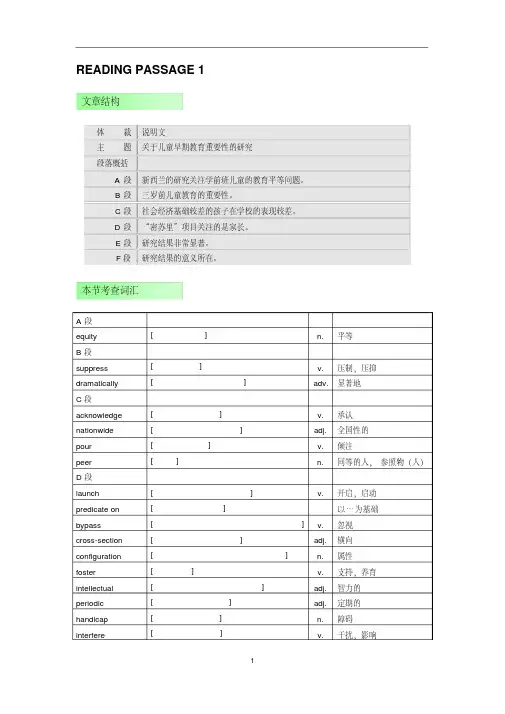
READING PASSAGE 1文章结构体裁说明文主题关于儿童早期教育重要性的研究段落概括A段新西兰的研究关注学前班儿童的教育平等问题。
B段三岁前儿童教育的重要性。
C段社会经济基础较差的孩子在学校的表现较差。
D段“密苏里”项目关注的是家长。
E段研究结果非常显著。
F段研究结果的意义所在。
本节考查词汇A段equity []n. 平等B段suppress []v. 压制,压抑dramatically []adv. 显著地C段acknowledge []v. 承认nationwide []adj. 全国性的pour []v. 倾注peer []n. 同等的人,参照物(人)D段launch []v. 开启,启动predicate on []以…为基础bypass []v. 忽视cross-section []adj. 横向configuration []n. 属性foster []v. 支持,养育intellectual []adj. 智力的periodic []adj. 定期的handicap []n. 障碍interfere []v. 干扰,影响E段evaluate []v. 评价phenomenal []adj. 显著的,轰动的auditory []adj. 听觉的verbal []adj. 口头的eliminate []v. 消除stress []n. 压力interaction []n. 互动F段perpetuate []v. 使永恒access to …[]能够获得…vital []adj. 至关重要的Questions 1-4『题型』PARAGRAPH MATCHING『解析』这种题型大都是对段落主题的变相考查。
应尽量通过段落主题和题干关键字之间的联系,首先大概确定至某个段落,然后再在该段落中找到确切替换,最终确定答案。
略读过程中,重点关注的段落主题句位置:a.段落首句(占80%强)b.表示转折的段落次句(占10%左右)c.段落末句(占10%左右)注意:由于文章首段通常要先介绍背景,在段末才会引出文章主题,所以:d. 首段应读完首句和末句题号关键词原文定位题解1 range offamily type D部分第一段末句答案:D只有D段主题句中的parents与题干中family一词相关,应该先在该段寻找familytype。

剑5test3speaking参考答案剑桥5test3 speakingPart 11.Do you prefer relaxing at home or going out in the evening? Why?When I have money, I like to going out in the evening with my friends to relax. We usually go to a bar or KTV to eat together and have fun. When I don’t have money, I like to stay at home to relax.I often watch a movie on the computer; listen to music, read some books to relax.2.when you go out for an evening, what do you like to do?I’d like to go to KTV with my friends. We all like music very much, especially for pop music and rock music. The lyrics and tempo are easy to follow and interesting to know. Singing make us feel happy and relaxed.3. How popular is this with other people in your country?It is very popular in my country. Singing not only helps people to release pressure, but also enable people to make more friends during singing together.Part 2Describe one of your friendsI’d like to talk about my best friend ……., I knew him when I was in middle school. We have known each other for 5years. We often study together, read some books, watch a movie, and play basketball in our spare time. I think he is my best friend because we can share our happiness and sorrows together. He always be my side and listen to me when I was down, also I usually offer him a hand when he is in trouble. Both of us feel very good to bewith each other. That’s why I like to play with him.Part 31.What do you think are the most important qualities for friends to have?I think honesty, patience, and easy going are the most important qualities for friends to have. Because no one likes to hear lies every day, and a patient friends can make people feel peaceful. An easy going friend can deal with all kinds of people, so everyone like to be with them.2. Which are more important to people, their family or friends? Why?I think family is more important. Because family would never leave you alone no matter what happened, also it is family that supports you without any purpose and reason.3. what do you think causes friendship to break up?Misunderstanding is the top reason for friendship to break up. Many people don’t like to express their feelings quite much to friends, and this will make people have a wrong understanding to each other, especially for some important things.。
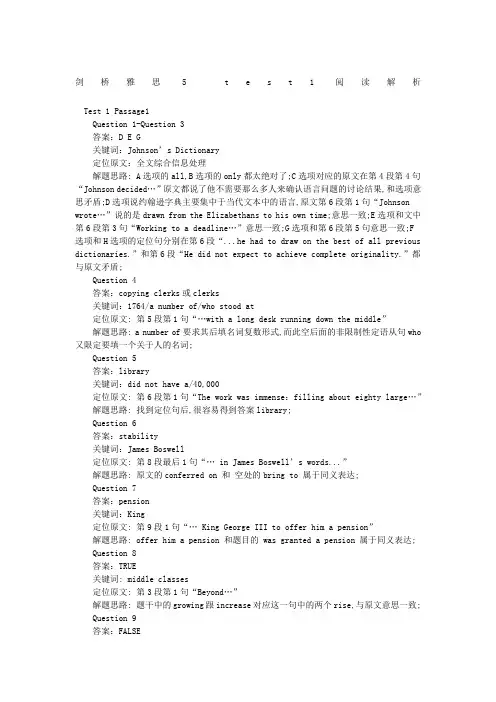
剑桥雅思5t e s t1阅读解析Test 1 Passage1Question 1-Question 3答案:D E G关键词:Johnson’s Dictionary定位原文:全文综合信息处理解题思路: A选项的all,B选项的only都太绝对了;C选项对应的原文在第4段第4句“Johnson decided…”原文都说了他不需要那么多人来确认语言问题的讨论结果,和选项意思矛盾;D选项说约翰逊字典主要集中于当代文本中的语言,原文第6段第1句“Johnson wrote…”说的是drawn from the Elizabethans to his own time;意思一致;E选项和文中第6段第3句“Working to a deadline…”意思一致;G选项和第6段第5句意思一致;F选项和H选项的定位句分别在第6段“...he had to draw on the best of all previous dictionaries.”和第6段“He did not expect to achieve complete originality.”都与原文矛盾;Question 4答案:copying clerks或clerks关键词:1764/a number of/who stood at定位原文: 第5段第1句“…with a long desk running down the middle”解题思路: a number of要求其后填名词复数形式,而此空后面的非限制性定语从句who 又限定要填一个关于人的名词;Question 5答案:library关键词:did not have a/40,000定位原文: 第6段第1句“The work was immense:filling about eighty large…”解题思路: 找到定位句后,很容易得到答案library;Question 6答案:stability关键词:James Boswell定位原文: 第8段最后1句“… in James Boswell’s words...”解题思路: 原文的conferred on 和空处的bring to 属于同义表达;Question 7答案:pension关键词:King定位原文: 第9段1句“… King George III to offer him a pension”解题思路: offer him a pension 和题目的 was granted a pension 属于同义表达;Question 8答案:TRUE关键词: middle classes定位原文: 第3段第1句“Beyond…”解题思路: 题干中的growing跟increase对应这一句中的两个rise,与原文意思一致;Question 9答案:FALSE定位原文: 第3段第2句“...as famous in his own time as in ours...”解题思路: 这句话表明他当时跟现代都享有盛誉,题干与原文矛盾;题干的 well known 为文章里这句话中的famous的同义替换;Question 10答案: NOT GIVEN关键词:several years定位原文: 第4段内容解题思路: 按照判断是非题的顺序原则,这题在文章中的定位应该在第9题在文章中所定位的语句后面,同时又应该出现在第11题定位语句的前面,故应该从第3段末开始找一直到第4段中间,我们找不到任何跟题干相关的信息,故此题为not given;Question 11答案:FALSE关键词: academy定位原文:第4段第4句“Johnson decided he did not need…”解题思路: 这句话正说明约翰逊并未建立研究院来协助他完成字典的编纂;Question 12答案: FALSE关键词:payment定位原文: 第4段最后1句“He was to be paid …”解题思路: He was to be paid……installment对应,明确提到了得到分期付款,跟题干矛盾;点击获取剑桥雅思阅读4-12真题及解析汇总Question 13答案: TRUE关键词:assistants/publication定位原文: 第5段最后1句“He was also helped by six assistants…”解题思路: 题干中的 not survive 跟文章中这句话的die对应,根据文意,题目表述是正确的;Test 1 Passage 2Question 14答案:F关键词:biological explanation/teacher-subject定位原文: F段第1句“…and that Milgram’s teacher-subjects were just following…”解题思路: 文章F段第一句中genetic,built-in,instinct这些词与题干中的biological explanation对应;Question 15答案:A关键词:explanation/for the experiment定位原文: A段最后1句“Specifically…”解题思路: 定位句中的短语in the cause of 即为题干explanation的同义替换;Question 16答案: B定位原文: B段第3句“The supposed “pupil” was…”解题思路: 找到对应句后很容易得出答案B;Question 17答案: D关键词:expected/statistical定位原文: D段倒数第2句“The phychiatrists felt that “most subjects…”解题思路: 定位到D段后,发现这些数字都是描述的实验预期的结果;Question 18答案: I关键词:general aim/sociobiological study定位原文: I段第3句“This, in essence, is…”解题思路: 找到定位句后,比较容易得出答案;Question 19答案: C关键词:persuaded/continue定位原文: C段第2、3、4句“Many of the teacher-subjects balked…”解题思路: 注意go on即为 continue的同义替换;Question 20答案: B关键词:teacher-subjects were told...定位原文: A段最后1句“Specifically, Milgram told each volunteer…”解题思路: 定位句说得很清楚:Milgram向每位在试验中扮演教师角色的志愿者明确地解释,试验是为了崇高的教育事业而进行的,是要测试体罚犯错误的学生是否会对学生的学习能力产生积极的影响;这就对应选项B;Question 21答案: D关键词:instructed to...定位原文: B段最后1句“Milgram told the teacher-subject…”解题思路: 其中的instructed跟文章中的told对应,按照控制试验条件的规则,不管电压多髙都要直接施加;Question 22答案: C关键词: phychiatrists定位原文: D段第2句“The overwhelming consensus…”E段第1、2句“What were the actual resultsWell, over 60 per…”解题思路: 由这两句话的反差可以看出,精神科医生的确低估了试验对象对规则的遵从程度,其中的be willing to 跟题干中的willingness属于同义表达;Question 23答案:NOT GIVEN关键词:Yale University定位原文: A段第1句“...Stanley Milgram of Yale University tested 40 subjects from…”解题思路: all walks of life是社会各界的意思,我们并不能肯定试验者就是来自耶鲁大学的心理学学生;本题属于典型的完全未提及型NOT GIVEN;Question 24答案:TRUE关键词:explain/survival mechanism定位原文: F段第2句“A modem hard-core sociobiologist might…”解题思路: 定位句中的advantageous trait 与题干中的positive survival mechanism 属于同义表达;Question 25答案:FALSE关键词:sociobiological explanation定位原文: H段内容和I段第1句“Here we have two radically different…”解题思路: 定位句的两句话都在体现出个人价值观在被权威所统治;Question 26答案:FALSE关键词:sociobiology定位原文: I段整个段落内容解题思路: 我们在文章最后一段可以得知Milgram的实验并未解决社会生物学上的这个重大问题,只不过是证明了这个问题的存在;Test 1 Passage 3Question 27答案:YES关键词:environmentalists定位原文: 第1段第1、2句“For many…”解题思路: hit-list重要事件的列表,按计划迸行杀害的名单;在这里应该理解为一系列;Question 28答案: NOT GIVEN关键词:1972, only定位原文: 第2段第2句“...“the Limits to Growth”was published in 1972…”解题思路: 1972年这个信息只在上面这句话中出现,而按照顺序解题原则,这道题目的答案只能在第二段中寻找,实际上该段并未提到任何关于资料搜集开始时间的信息;所以这是一道典型的NOT GIVEN;Question 29答案: NO关键词: starving people定位原文: 第2段第3句“Fewer people are starving…”解题思路: 这句话意思非常明确了,和题目表述矛盾;Question 30答案: NOT GIVEN关键词: species定位原文: 第2段第5句话“Third, although species are indeed…”解题思路: 这一句虽然提到了物种,但是并没有提到题目中论述的那个话题;而且,题目其实也是在变相地将新旧物种比较,属于并不存在的比较关系,因此应选择NOT GIVEN;Question 31答案: YES关键词: industrialisation定位原文: 第2段第6句“And finally, most forms…”解题思路: 这句话说明工业化早期的确引起了一些污染问题,,故此题选YES;Question 32答案: NO关键词: economic growth/best定位原文: 第2段第6句“...and therefore best cured not by restricting…”解题思路: 文中已经明确提到控制污染的最好方式不是减慢经济发展速度,而是加速经济发展;Question 33答案: C关键词:paragraph 4定位原文: 第4段第2句“Scientific funding goes mainly…”解题思路: 题目问的是作者提出了对哪个科研领域的关注,定位句明确说明这同样也给人们造成了一种印象,似乎存在许多潜在的问题,而事实并非如此,言下之意就是要确认好对研究领域的选择,C选项符合;Question 34答案: D关键词:Worldwide Fund for Nature定位原文: 第5段第3句“Understandably, perhaps, they sometimes…”解题思路: 定位句明确说明也许有时候他们夸张了事实,选项D符合;Question 35答案: C关键词:paragraph 6定位原文:第6段第2句“That would matter less if…”解题思路:题目问的是作者对游说团体的看法,C选项和原文表述一致;Question 36答案: B关键词:newspaper print定位原文: 第7段第3句“Newspaper and broadcasters…”解题思路: 定位句说报纸和广播应该提供给公众所需要的,选项B满足读者需求,和原文表述一致;Question 37答案: B关键词:America定位原文: 第8段第3句“Yet, even if…”解题思路: 题目问的是作者对美国垃圾问题的观点是什么,定位句说即便垃圾持续增长,人口增长,整个21世纪美国产生的垃圾只占整个美国面积的12万分之一,言下之意,就是B 选项:垃圾问题没有我们想象的严重;Question 38答案: E. long-term关键词: global warming/a定位原文: 文章中最后4段内容解题思路:这里应该填一个表示正面惑情色彩的形容词,而且这个词要可以和challenge搭配;那么选择范围就缩小到了agreed/right/long-term/surprising/urgent五个词上,,然后再根据后半句but来判断,,作者对全球变暖问题的态度是乐观的,显然应该是一个与catastrophic相反的词,因此范围最终缩小到了long-term;Question 39答案: D. right关键词:way定位原文: 文章最后4段内容解题思路: 要和way来搭配,修饰way;按照题目中句子的含义来说,就是说以一个比较好的,合理的处理方法,就不会有灾难性的影响,只有right是最符合的;Question 40答案: I. urgent关键词: health problem定位原文: 倒数第2段第2句“…most pressing…”解题思路: 这句话中的most pressing指最急迫的,最迫切的,正好和词库中的urgent 相对应,属于同义表达;。
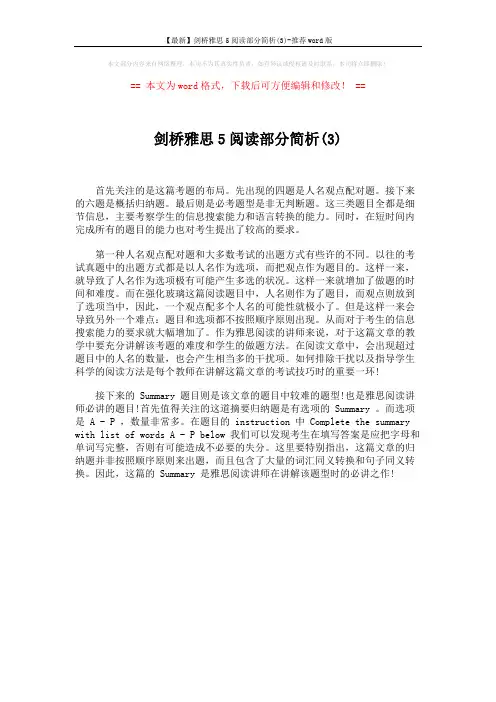
【最新】剑桥雅思5阅读部分简析(3)-推荐word版本文部分内容来自网络整理,本司不为其真实性负责,如有异议或侵权请及时联系,本司将立即删除!== 本文为word格式,下载后可方便编辑和修改! ==剑桥雅思5阅读部分简析(3)首先关注的是这篇考题的布局。
先出现的四题是人名观点配对题。
接下来的六题是概括归纳题。
最后则是必考题型是非无判断题。
这三类题目全都是细节信息,主要考察学生的信息搜索能力和语言转换的能力。
同时,在短时间内完成所有的题目的能力也对考生提出了较高的要求。
第一种人名观点配对题和大多数考试的出题方式有些许的不同。
以往的考试真题中的出题方式都是以人名作为选项,而把观点作为题目的。
这样一来,就导致了人名作为选项极有可能产生多选的状况。
这样一来就增加了做题的时间和难度。
而在强化玻璃这篇阅读题目中,人名则作为了题目,而观点则放到了选项当中,因此,一个观点配多个人名的可能性就极小了。
但是这样一来会导致另外一个难点:题目和选项都不按照顺序原则出现。
从而对于考生的信息搜索能力的要求就大幅增加了。
作为雅思阅读的讲师来说,对于这篇文章的教学中要充分讲解该考题的难度和学生的做题方法。
在阅读文章中,会出现超过题目中的人名的数量,也会产生相当多的干扰项。
如何排除干扰以及指导学生科学的阅读方法是每个教师在讲解这篇文章的考试技巧时的重要一环!接下来的 Summary 题目则是该文章的题目中较难的题型!也是雅思阅读讲师必讲的题目!首先值得关注的这道摘要归纳题是有选项的 Summary 。
而选项是 A - P ,数量非常多。
在题目的 instruction 中 Complete the summary with list of words A - P below 我们可以发现考生在填写答案是应把字母和单词写完整,否则有可能造成不必要的失分。
这里要特别指出,这篇文章的归纳题并非按照顺序原则来出题,而且包含了大量的词汇同义转换和句子同义转换。
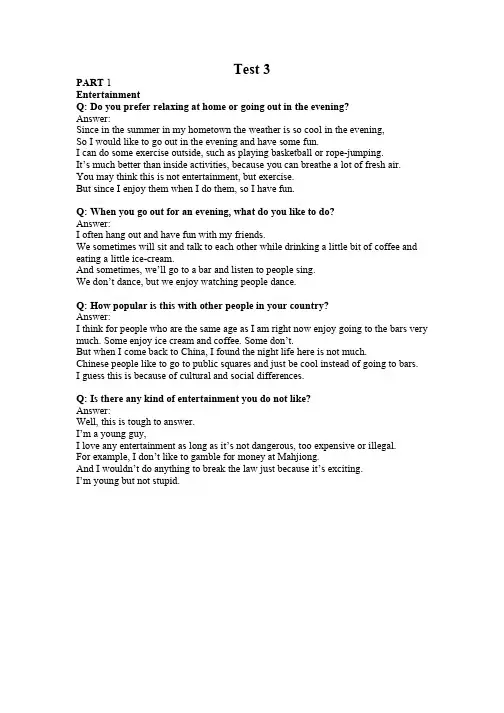
PART 1EntertainmentQ: Do you prefer relaxing at home or going out in the evening?Answer:Since in the summer in my hometown the weather is so cool in the evening,So I would like to go out in the evening and have some fun.I can do some exercise outside, such as playing basketball or rope-jumping.It’s much better than inside activities, because you can breathe a lot of fresh air.You may think this is not entertainment, but exercise.But since I enjoy them when I do them, so I have fun.Q: When you go out for an evening, what do you like to do?Answer:I often hang out and have fun with my friends.We sometimes will sit and talk to each other while drinking a little bit of coffee and eating a little ice-cream.And sometimes, we’ll go to a bar and listen to people sing.We don’t dance, but we enjoy watching people dance.Q: How popular is this with other people in your country?Answer:I think for people who are the same age as I am right now enjoy going to the bars very much. Some enjoy ice cream and coffee. Some don’t.But when I come back to China, I found the night life here is not much.Chinese people like to go to public squares and just be cool instead of going to bars.I guess this is because of cultural and social differences.Q: Is there any kind of entertainment you do not like?Answer:Well, this is tough to answer.I’m a young guy,I love any entertainment as long as it’s not dangerous, too expensive or illegal.For example, I don’t like to gamble for money at Mahjiong.And I wouldn’t do anything to break the law just because it’s exciting.I’m young but not stupid.Describe one of your friends:You should say:•How you met•How long you have known each other•How you spend time togetherAnd explain why you like this person.1.朋友多, 很重要, 最宝贵的财富,交朋友的好处2.健身中心见到的, 刚去加拿大2个月当时英文不好, 外国人对中国文化很感兴趣我们一拍即合3.将近一年,从陌生人, 到熟人,到朋友,我们加深感情4.骑自行车, 划船, 开车带我们去hamilton闲逛5.了解中国文化,介绍外国外国文化, 第一个外国朋友, 很特别热情好客, 友谊,温暖, 给我帮助, 在异国他乡不在孤独朋友:Friends are important in our lives.By communicating with different people at different time,I can learn a lot from my friends,such as how to be happy, how to work with others and how to deal with the world around us.Friends are the most important assets in our lives.The friend I want to talk about today is a foreigner,a Canadian that I met when I arrived in Canada just for 2 months.So, one day, I was working out at a gym, and he talked to me just because he’s deeply interested in Chinese culture.And we hit it off (一拍即合) great.So we became fast friends.Now, I’ve known him for almost a year.And first, we were total strangers, then acquaintances, and finally good friends. During this one year, our friendship developed fast.When we hung out together, we often rode bicycles together near the lake Ontario. And we sometimes would go boating together.He often drove us around in his car and showed the city of Hamilton.I think he’s a pretty cool guy.He’s extremely hospitable and friendly.And this made me feel very warm, because, you know, I was in a different country, without my family and my old friends. So he didn’t make me feel helpless and lonely. He’s got a great personality and is always giving and forgiving.That’s why I like him very much. (241 words)PART 3Qualities of Friends:Q: What do you think are the most important qualities for friends to have?构思:信任 trust真诚 sincerity loyalty帮助, 原谅 helpful forgiving尊重彼此隐私: respect privacy一直坚守在朋友左右: available, be thereAnswer:I think a good friend is always someone who trusts you and can be trusted.And this person should show sincerity in this friendship and be always loyal to you. Life is full of ups and downs, and when you’re down,he’s always there to give you a hand.Sometimes we get emotional and unreasonable under pressure, and to be a good friend, we need to learn to understand this and forgive the other person is he or she yells at you or takes out the aggressive feeling on you.拿你撒气But most importantly, good friends always respect the privacy of each other.It’s true that you’re closer to me than others. But still, you’re you, I’m me.There’s a famous Chinese saying, “Familiarity breeds contempt.” 熟来生厌So keeping a reasonable distance is imperative to a healthy friendship. (144 words) ------------------------------------------------------------------------------------------------------- Q: Which are more important to people, their family or their friends? Why?构思:都重要这就想问空气和水哪个重要一样家人: unconditional support security朋友: help, common experience in growing up, 放松, 不会唠叨你Answer:I think to a large degree, they are equally important to me.It’s like asking me which one is more important between water and air.Family is important to a person because when the world ends,your family is still behind you.Family members provide you unconditional love and support.On the other hand, friends can offer you different kind of help. Because you grow up together, so you have a feeling they really get you.And friends never nag at you. So when you’re with your friends, you’re more relaxed.(90 words)Q: What do you think causes friendships to break up?构思:dishonestytrust crisisoutgrow your friendsloss of common languageAnswer:I guess the reason why most friendships break up is because people lose trust in each other. Maybe there’s a case of dishonesty where one person lies to another. And then they feel it’s no longer working out anymore.Another reason is that maybe one of the two friends grow too fast and develop too rapidly so he feels that he has outgrow his friend in many ways and he doesn’t know how to be with him anymore. The loss of common language also causes a friendship to break up. (90 words)------------------------------------------------------------------------------------------------------- Other relationshipsQ: What other types of relationships, apart from friends and family, are important in people’s lives today?构思:老师, 提供人生指导, 痛苦的时候给与鼓励, 迷茫的时候给与方向同事: 工作, 职场互相竞争, 共同提高, 打拼不在孤独, 而且是将来可能的朋友. Answer:I think teachers are also important people in our lives.They not only give us knowledge,but guidance when we’re not sure about life as well.When we’re in pain, they give us energy and encouragement;When we’re lost, they provide us a clear direction again.They’re the light house in our lives.Apart from teachers, your colleagues are also indispensable to you.You compete against each other, and much growth can be achieved through such competition.Your professional life is no longer lonely.And what’s more, these people can become your future friends. (94 words)Q: How relationships with neighbors where you live where you live changed in recent years? How?构思:原来象一家人, 天天交流.现在, 各回各家, 过自己的生活,没有交流, 象陌生人.人与人之间变得indifferent, isolated, 孤独了Answer:I didn’t want to see this happen but sadly the relationship between neighbors from where I live changed negatively over the past years.I remember when I was young, all my neighbors were like my family members.We were chatting all the time, we exchange greetings everyday,and we even visit each other home often.At that time, Chinese people lived in dormitory-style buildings.And many families share the same kitchen and same bathroom.So people were very close to each other.But in the past few years, since we’ve moved into an apartment building.We became apart from our neighbors.We hardly ever talk to each other.And we became more indifferent to each other.So, in a sense, modern people are lonely because we’re more isolated than before. (130 words)Q: How important do you think it is for a person to spend some time alone?构思:spend some quality time with yourself 优质时间be yourself, no requirement from others 没有别人的要求, 做自己thinking, summarizing life总结生活renew yourself 更新自我Answer:Even though friendship can prevent you from feeling lonely,but it’s equally important for a person to spend some quality time alone.You know, maybe drink a little coffee, read some literature, or even just play computer games.During such time, you can totally be yourself, and there’s no requirement from others, such as the pressure from your parents or the obligation towards your friends.You can just sit there, with the coffee in your mouth, thinking and summarizing your life.It doesn’t have to be long, maybe just 15 minutes a day. And then you feel refreshed and renewed.(100 words)。
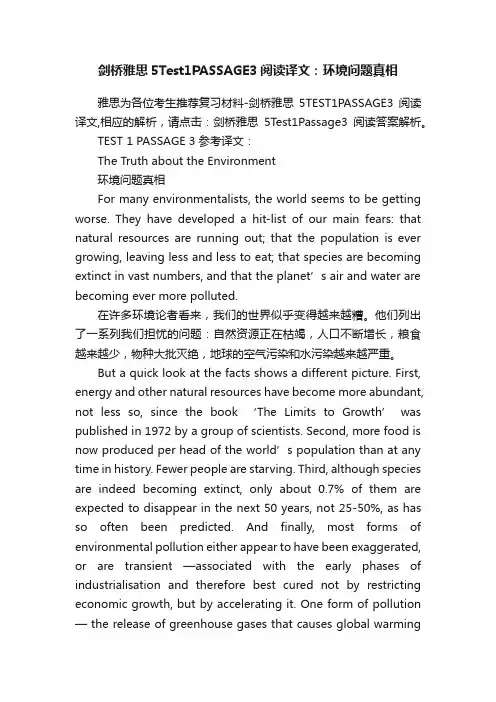
剑桥雅思5Test1PASSAGE3阅读译文:环境问题真相雅思为各位考生推荐复习材料-剑桥雅思5TEST1PASSAGE3阅读译文,相应的解析,请点击:剑桥雅思5Test1Passage3阅读答案解析。
TEST 1 PASSAGE 3 参考译文:The Truth about the Environment环境问题真相For many environmentalists, the world seems to be getting worse. They have developed a hit-list of our main fears: that natural resources are running out; that the population is ever growing, leaving less and less to eat; that species are becoming extinct in vast numbers, and that the planet’s air and water are becoming ever more polluted.在许多环境论者看来,我们的世界似乎变得越来越糟。
他们列出了一系列我们担忧的问题:自然资源正在枯竭,人口不断增长,粮食越来越少,物种大批灭绝,地球的空气污染和水污染越来越严重。
But a quick look at the facts shows a different picture. First, energy and other natural resources have become more abundant, not less so, since the book ‘The Limits to Growth’ was published in 1972 by a group of scientists. Second, more food is now produced per head of the world’s population than at any time in history. Fewer people are starving. Third, although species are indeed becoming extinct, only about 0.7% of them are expected to disappear in the next 50 years, not 25-50%, as has so often been predicted. And finally, most forms of environmental pollution either appear to have been exaggerated, or are transient —associated with the early phases of industrialisation and therefore best cured not by restricting economic growth, but by accelerating it. One form of pollution — the release of greenhouse gases that causes global warming— does appear to be a phenomenon that is going to extend well into our future, but its total impact is unlikely to pose a devastating problem. A bigger problem may well turn out to be an inappropriate response to it.但我们只要简单分析一下事实就会发现另外一种情况。
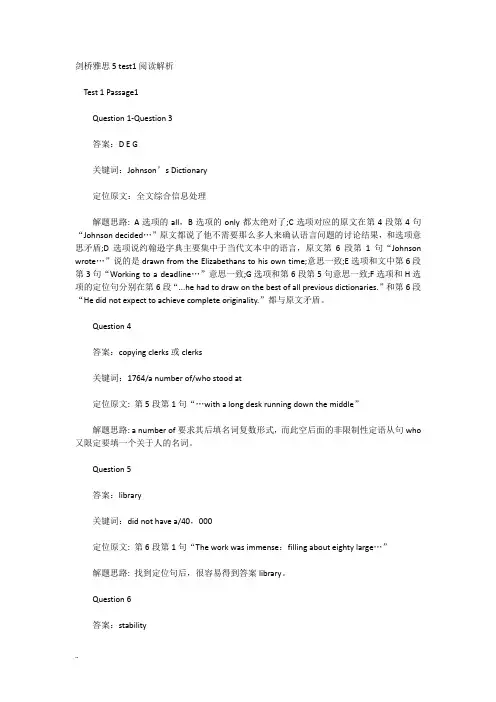

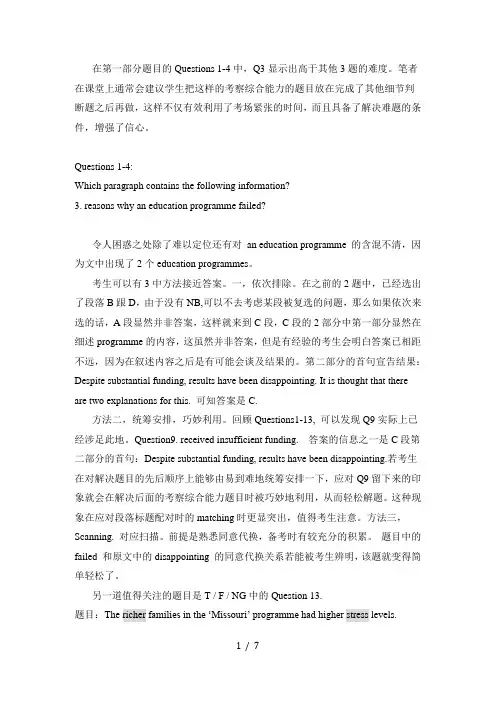
在第一部分题目的Questions 1-4中,Q3显示出高于其他3题的难度。
笔者在课堂上通常会建议学生把这样的考察综合能力的题目放在完成了其他细节判断题之后再做,这样不仅有效利用了考场紧张的时间,而且具备了解决难题的条件,增强了信心。
Questions 1-4:Which paragraph contains the following information?3. reasons why an education programme failed?令人困惑之处除了难以定位还有对an education programme 的含混不清,因为文中出现了2个education programmes。
考生可以有3中方法接近答案。
一,依次排除。
在之前的2题中,已经选出了段落B跟D,由于没有NB,可以不去考虑某段被复选的问题,那么如果依次来选的话,A段显然并非答案,这样就来到C段,C段的2部分中第一部分显然在细述programme的内容,这虽然并非答案,但是有经验的考生会明白答案已相距不远,因为在叙述内容之后是有可能会谈及结果的。
第二部分的首句宣告结果:Despite substantial funding, results have been disappointing. It is thought that there are two explanations for this. 可知答案是C.方法二,统筹安排,巧妙利用。
回顾Questions1-13, 可以发现Q9实际上已经涉足此地。
Question9. received insufficient funding. 答案的信息之一是C段第二部分的首句:Despite substantial funding, results have been disappointing.若考生在对解决题目的先后顺序上能够由易到难地统筹安排一下,应对Q9留下来的印象就会在解决后面的考察综合能力题目时被巧妙地利用,从而轻松解题。
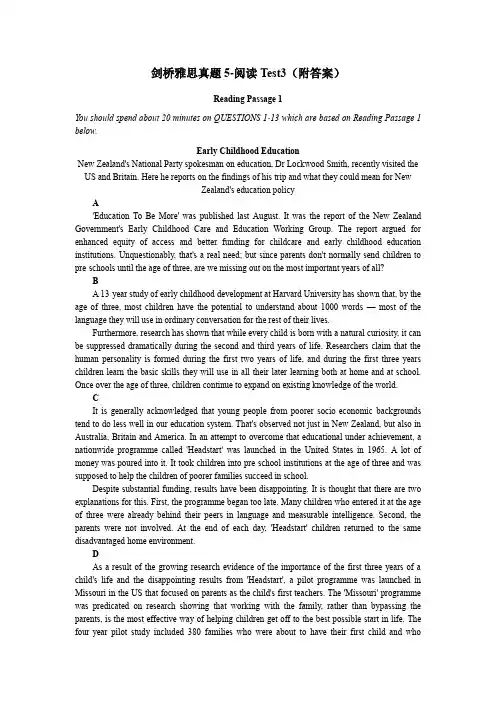
剑桥雅思真题5-阅读Test3(附答案)Reading Passage 1You should spend about 20 minutes on QUESTIONS 1-13 which are based on Reading Passage 1 below.Early Childhood EducationNew Zealand's National Party spokesman on education, Dr Lockwood Smith, recently visited the US and Britain. Here he reports on the findings of his trip and what they could mean for NewZealand's education policyA'Education To Be More' was published last August. It was the report of the New Zealand Government's Early Childhood Care and Education Working Group. The report argued for enhanced equity of access and better funding for childcare and early childhood education institutions. Unquestionably, that's a real need; but since parents don't normally send children to pre-schools until the age of three, are we missing out on the most important years of all?BA 13-year study of early childhood development at Harvard University has shown that, by the age of three, most children have the potential to understand about 1000 words — most of the language they will use in ordinary conversation for the rest of their lives.Furthermore, research has shown that while every child is born with a natural curiosity, it can be suppressed dramatically during the second and third years of life. Researchers claim that the human personality is formed during the first two years of life, and during the first three years children learn the basic skills they will use in all their later learning both at home and at school. Once over the age of three, children continue to expand on existing knowledge of the world.CIt is generally acknowledged that young people from poorer socio-economic backgrounds tend to do less well in our education system. That's observed not just in New Zealand, but also in Australia, Britain and America. In an attempt to overcome that educational under-achievement, a nationwide programme called 'Headstart' was launched in the United States in 1965. A lot of money was poured into it. It took children into pre-school institutions at the age of three and was supposed to help the children of poorer families succeed in school.Despite substantial funding, results have been disappointing. It is thought that there are two explanations for this. First, the programme began too late. Many children who entered it at the age of three were already behind their peers in language and measurable intelligence. Second, the parents were not involved. At the end of each day, 'Headstart' children returned to the same disadvantaged home environment.DAs a result of the growing research evidence of the importance of the first three years of a child's life and the disappointing results from 'Headstart', a pilot programme was launched in Missouri in the US that focused on parents as the child's first teachers. The 'Missouri' programme was predicated on research showing that working with the family, rather than bypassing the parents, is the most effective way of helping children get off to the best possible start in life. The four-year pilot study included 380 families who were about to have their first child and whorepresented a cross-section of socio-economic status, age and family configurations. They included single-parent and two-parent families, families in which both parents worked, and families with either the mother or father at home.The programme involved trained parent — educators visiting the parents' home and working with the parent, or parents, and the child. Information on child development, and guidance on things to look for and expect as the child grows were provided, plus guidance in fostering the child's intellectual, language, social and motor-skill development. Periodic check-ups of the child's educational and sensory development (hearing and vision) were made to detect possible handicaps that interfere with growth and development. Medical problems were referred to professionals.Parent-educators made personal visits to homes and monthly group meetings were held with other new parents to share experience and discuss topics of interest. Parent resource centres, located in school buildings, offered learning materials for families and facilitators for child care.EAt the age of three, the children who had been involved in the 'Missouri' programme were evaluated alongside a cross-section of children selected from the same range of socio-economic backgrounds and family situations, and also a random sample of children that age. The results were phenomenal. By the age of three, the children in the programme were significantly more advanced in language development than their peers, had made greater strides in problem solving and other intellectual skills, and were further along in social development. In fact, the average child on the programme was performing at the level of the top 15 to 20 per cent of their peers in such things as auditory comprehension, verbal ability and language ability.Most important of all, the traditional measures of 'risk', such as parents' age and education, or whether they were a single parent, bore little or no relationship to the measures of achievement and language development. Children in the programme performed equally well regardless of socio-economic disadvantages. Child abuse was virtually eliminated. The one factor that was found to affect the child's development was family stress leading to a poor quality of parent-child interaction. That interaction was not necessarily bad in poorer families.FThese research findings are exciting. There is growing evidence in New Zealand that children from poorer socio-economic backgrounds are arriving at school less well developed and that our school system tends to perpetuate that disadvantage. The initiative outlined above could break that cycle of disadvantage. The concept of working with parents in their homes, or at their place of work, contrasts quite markedly with the report of the Early Childhood Care and Education Working Group. Their focus is on getting children and mothers access to childcare and institutionalized early childhood education. Education from the age of three to five is undoubtedly vital, but without a similar focus on parent education and on the vital importance of the first three years, some evidence indicates that it will not be enough to overcome educational inequity.Questions 1-4Reading Passage 1 has six sections, A-F.Which paragraph contains the following information?Write the correct letter A-F in boxes 1-4 on your answer sheet.1 details of the range of family types involved in an education programme2 reasons why a child's early years are so important3 reasons why an education programme failed4 a description of the positive outcomes of an education programmeQuestions 5-10Classify the following features as characterisingA the 'Headstart' programmeB the 'Missouri' programmeC both the 'Headstart' and the 'Missouri' programmesD neither the 'Headstart' nor the 'Missouri' programmeWrite the correct letter A, B, C or D in boxes 5-10 on your answer sheet.5 was administered to a variety of poor and wealthy families6 continued with follow-up assistance in elementary schools7 did not succeed in its aim8 supplied many forms of support and training to parents9 received insufficient funding10 was designed to improve pre-schoolers’ educational developmentQuestions 11-13Do the following statements agree with the information given in Reading Passage 1?In boxes 11-13 on your answer sheet, writeTRUE if the statement agrees with the informationFALSE if the statement contradicts the informationNOT GIVEN if there is no information on this11 Most ‘Missouri’ programme three-year-olds scored highly in areas such as listening speaking, reasoning and interacting with others.12 ‘Missouri’ programme children of young, uneducated, single parents scored less highly on the tests.13 The richer families in the ‘Missouri’ programme had higher stress levels.Reading Passage 2You should spend about 20 minutes on QUESTIONS 14-26 which are based on Reading Passage 2 below.Disappearing DeltaA The fertile land of the Nile delta is being eroded along Egypt's Mediterranean coast at an astounding rate, in some parts estimated at 100 metres per year. In the past, land scoured away from the coastline by the current of the Mediterranean Sea used to be replaced by sediment brought down to the delta by the River Nile, but this is no longer happening.B Up to now, people have blamed this loss of delta land on the two large dams at Aswan in the south of Egypt, which hold back virtually oil of the sediment that used to flow down the river. Before the dams were built, the Nile Bowed freely, carrying huge quantities of sediment north from Africa's interior to be deposited on the Nile delta. This continued for 7000 years, eventually covering a region of over 22,000 square kilometres with layers of fertile silt. Annual flooding brought in new, nutrient-rich soil to the delta region, replacing what had been washed away by the sea, and dispensing with the need for fertilizers in Egypt’s richest food-growing area. But when the Aswan dams were constructed in the 20th century to provide electricity and irrigation, and to protect the huge population centre of Cairo and its surrounding areas from annual flooding and drought, most of the sediment with its natural fertilizer accumulated up above the dam in thesouthern, upstream half of Lake Nasser, instead of passing down to the delta.C Now, however, there turns out to be more to the story. It appears that the sediment-free water emerging from the Aswan dams picks up silt and sand as it erodes the river bed and banks on the 800-kilometre trip lo Cairo. Daniel Jean Stanley of the Smithsonian Institute noticed that water samples taken in Cairo, just before the river enters the delta, indicated that the river sometimes carries more than 850 grams of sediment per cubic metre of water - almost half of what it carried before the dams were built. ‘I’m ashamed to say that the significance of this didn't strike me until after I had read 50 or 60 studies,’ says Stanley in Marine Geology. "There is still a lot of sediment coming into the delta, but virtually no sediment comes out into the Mediterranean to replenish the coastline.So this sediment must be trapped on the delta itself.’D Once north of Cairo, most of the Nile water is diverted into more than 10,000 kilometres of irrigation canals and only a small proportion reaches the sea directly through the rivers in the delta. The water in the irrigation canals is still or very slow-moving and thus cannot carry sediment, Stanley explains. The sediment sinks to the bottom of the canals and then is added to fields by farmers or pumped with the water into the four large freshwater lagoons that are located near the outer edges of the delta. So very little of it actually reaches the coastline to replace what is being washed away by the Mediterranean currents.E The farms on the delta plains and fishing and aquaculture in the lagoons account for much of Egypt's food supply. But by the time the sediment has come to rest in the fields and lagoons it is laden with municipal, industrial and agricultural waste from the Cairo region, which is home to more than 40 million people. Pollutants are building up faster and faster,’ says Stanley. Based on his investigations of sediment from the delta lagoons, Frederic Siegel of George Washington University concurs.’ In Manzalah Lagoon, for example, the increase in mercury, lead and zinc coincided with the building of the High Dam at Aswan, the availability of cheap electricity, and the development of major power-based industries,’ he says. Since that time the concentration of mercury has increased significantly. Lead from engines that use leaded fuels and from other industrial sources has also increased dramatically. These poisons can easily enter the food chain, affecting the productivity of fishing and farming. Another problem is that agricultural wastes include fertilizers which stimulate increases in plant growth in the lagoons and upset the ecology of the area, with serious effects on the fishing industry.F According to Siegel, international environmental organisations are beginning to pay closer attention to the region, partly because of the problems of erosion and pollution of the Nile delta, but principally because they fear the impact this situation could have on the whole Mediterraneancoastal ecosystem. But there are no easy solutions. In the immediate future, Stanley believes that one solution would be to make artificial floods to flush out the delta waterways, in the same way that natural floods did before the construction of the dams. He says, however, that in the long term an alternative process such as desalination may have to be used to increase the amount of water available. ‘In my view, Egypt must devise a way to have more water running through the river and the delta,’ says Stanley. Easier said than done in a desert region with a rapidly growing population. Question 14-17Reading Passage 2 has six paragraphs, A-F.Choose the correct heading for paragraphs B and D-F from the list of headings below.Write the correct number i-viii in boxes 14-17 on your answer sheet.List of Headingsi. Effects of irrigation on sedimentationii. The danger of flooding the Cairo areaiii. Causing pollution in the Mediterraneaniv. Interrupting a natural processv. The threat to food productionvi. Less valuable sediment than beforevii. Egypt's disappearing coastline16Paragraph E17Paragraph FQuestion 18-23Do the following statements reflect the claims of the writer in Reading Passage 2?In boxes 18-23 on your answer sheet, writeTRUE if the statement reflects the claims of the writerFALSE if the statement contradicts the claims of the writerNOT GIVEN if it is impossible to say what the writer thinks about this18. Coastal erosion occurred along Egypt’s Mediterranean coast before the building of the Aswan dams.19. Some people predicted that the Aswan dams would cause land loss before they were built.20. The Aswan dams were built to increase the fertility of the Nile delta.21. Stanley found that the levels of sediment in the river water in Cairo were relatively high.22. Sediment in the irrigation canals on the Nile delta causes flooding.23. Water is pumped from the irrigation canals into the lagoons.Question 24-26Complete the summary of paragraphs E and F with the list of words A-H below.Write the correct letter A-H into boxes 24-26 on your answer sheet.In addition to the problem of coastal erosion, there has been a marked increase in-the level of 24 ………… contained in the silt deposited in the Nile delta. To deal with this, Stanley suggeststhe use of 25………… in the short term, and increasing the amount of water available throughYou should spend about 20 minutes on QUESTIONS 27-40 which are based on Reading Passage 3 below.The Return of Artificial IntelligenceIt is becoming acceptable again to talk of computers performing human tasks such asproblem-solving and pattern-recognitionA After years in the wilderness, the term 'artificial intelligence’ (Al) seems poised to make a comeback. Al was big in the 1980s but vanished in the 1990s. It re-entered public consciousness with the release of Al, a movie about a robot boy. This has ignited public debate about Al, but the term is also being used once more within the computer industry. Researchers, executives and marketing people are now using the expression without irony or inverted commas. And it is not always hype. The term is being applied, with some justification, to products that depend on technology that was originally developed by Al researchers. Admittedly, the rehabilitation of the term has a long way to go, and some firms still prefer to avoid using it. But the fact that others are starting to use it again suggests that Al has moved on from being seen as an over-ambitious and under-achieving field of research.B The field was launched, and the term 'artificial intelligence' coined, at a conference in 1956 by a group of researchers that included Marvin Minsky, John McCarthy, Herbert Simon and Alan Newell, all of whom went on to become leading figures in the field. The expression provided an attractive but informative name for a research programme that encompassed such previously disparate fields as operations research, cybernetics, logic and computer science. The goal they shared was an attempt to capture or mimic human abilities using machines. That said, different groups of researchers attacked different problems, from speech recognition to chess playing, in different ways; Al unified the field in name only. But it was a term that captured the public imagination.C Most researchers agree that Al peaked around 1985. A public reared on science-fiction movies and excited by the growing power of computers had high expectations. For years, Al researchers had implied that a breakthrough was just around the corner. Marvin Minsky said in 1967 that within a generation the problem of creating 'artificial intelligence, would besubstantially solved. Prototypes of medical-diagnosis programs and speech recognition software appeared to be making progress. It proved to be a false dawn. Thinking computers and household robots failed to materialise, and a backlash ensued. There was undue optimism in the early 1980s,’ says David Leake, a researcher at Indiana University. Then when people realised these were hard problems, there was retrenchment. By the late 1980s, the term Al was being avoided by many researchers, who opted instead to align themselves with specific sub-disciplines such as neural networks, agent technology, case-based reasoning, and so on.'D Ironically, in some ways Al was a victim of its own success. Whenever an apparently mundane problem was solved, such as building a system that could land an aircraft unattended, the problem was deemed not to have been Al in the first place. 'If it works, it can't be Al,’ as Dr Leake characterises it. The effect of repeatedly moving the goal-posts in this way was that Al came to refer to 'blue-sky* research that was still years away from commercialisation. Researchers joked that Al stood for 'almost implemented'. Meanwhile, the technologies that made it onto the market, such as speech recognition, language translation and decision-support software, were no longer regarded as Al. Yet all three once fell well within the umbrella of Al research.E But the tide may now be turning, according to Dr Leake. HNC Software of San Diego, backed by a government agency, reckon that their new approach to artificial intelligence is the most powerful and promising approach ever discovered. HNC claim that their system, based on a duster of 30 processors, could be used to spot camouflaged vehicles on a battlefield or extract a voice signal from a noisy background - tasks humans can do well, but computers cannot. 'Whether or not their technology lives up to the claims made for it, the fact that HNC are emphasising the use of Al is itself an interesting development,’ says Dr Leake.F Another factor that may boost the prospects for Al in the near future is that investors are now looking for firms using clever technology, rather than just a clever business model, to differentiate themselves. In particular, the problem of information overload, exacerbated by the growth of e-mail and the explosion in the number of web pages, means there are plenty of opportunities for new technologies to help filter and categorise information - classic Al problems. That may mean that more artificial intelligence companies will start to emerge to meet this challenge.G The 1969 film, 2001: A Space Odyssey, featured an intelligent computer called HAL 9000. As well as understanding and speaking English, HAL could play chess and even learned to lipread. HAL thus encapsulated the optimism of the 1960s that intelligent computers would be widespread by 2001. But 2001 has been and gone, and there is still no sign of a HAL-like computer. Individual systems can play chess or transcribe speech, but a general theory of machine intelligence still remains elusive. It may be, however, that the comparison with HAL no longer seems quite so important, and Al can now be judged by what it can do, rather than by how well it matches up to a 30-year-old science-fiction film. 'People are beginning to realise that there are impressive things that these systems can do,' says Dr Leake hopefully.Question 27-31Reading Passage 3 has seven paragraphs, A-G.Which paragraph contains the following information?Write the correct letter A-G in boxes 27-31 on your answer sheet.NB You may use any letter more than once.27. how AI might have a military impact28. the fact that AI brings together a range of separate research areas29. the reason why AI has become a common topic of conversation again30. how AI could help deal with difficulties related to the amount of information available electronically31. where the expression AI was first usedQuestion 32-37Do the following statements agree with the information given in Reading Passage 3?In boxes 32-37 on your answer sheet, writeTRUE if the statement agrees with the informationFALSE if the statement contradicts the informationNOT GIVEN if there is no information about this32. The researchers who launched the field of AI had worked together on other projects in the past.33. In 1985, AI was at its lowest point.34. Research into agent technology was more costly than research into neural networks.35. Applications of AI have already had a degree of success.36. The problems waiting to be solved by AI have not changed since 1967.37. The film 2001: A Space Odyssey reflected contemporary ideas about the potential of AI computersQuestion 38-40Choose the correct letter A, B, C or D.Write your answers in boxes 38-40 on your answer sheet.38. According to researchers, in the late 1980s there was a feeling thatA. a general theory of AI would never be developed.B. original expectations of AI may not have been justified.C. a wide range of applications was close to fruition.D. more powerful computers were the key to further progress.39. In Dr Leake's opinion, the reputation of AI suffered as a result ofA. changing perceptions.B. premature implementation.C. poorly planned projectsD. commercial pressures.40. The prospects for AI may benefit fromA. existing AI applications.B. new business models.C. orders from internet-only companies.D. new investment priorities.参考答案1 D2 B3 C4 E5 B6 D7 A8 B9 D10 C11 TRUE12 FALSE13 NOT GIVEN14 iv15 i16 v17 viii18 YES19 NOT GIVEN20 NO21 YES22 NOT GIVEN23 YES24 F25 A26 B27 E28 B29 A30 F31 B32 NOT GIVEN33 FALSE34 NOT GIVEN35 TRUE35 FALSE37 TRUE38 B39 A40 D。
Amipnga剑桥雅思1-6阅读真题全接触讲解Time will pierce the surface or youth, will be on the beauty of the ditch dug a shallow groove ; Jane will eat rare!A born beauty, anything to escape his sickle sweep.-- Shakespeare剑桥雅思1-6阅读真题全接触作者:凯哥凯哥花了点时间把到目前为止的剑桥雅思系列A类试题的标题及其内容做了以下总结希望对大家有用处!剑桥雅思1Test 1 Test 2 Test 3 Test 4Reading Passage 1 A spark, a flint: How fire leapt to life Right and left-handedness in humans SPOKEN CORPUS COMES TO LIFE GLASS CAPTURING THE DANCE OF LIGHT Reading Passage 2 Zoo conservation programmes MIGRATORY BEEKEEPING Moles happy as homes go underground Why some women cross the finish line ahead of men Reading Passage 3 ARCHITECTURE�Creaching for the sky TOURISM A Workaholic Economy Population viability analysis剑桥雅思2 Test 1 Test 2 Test 3 Reading Passage 1 AIRPORTS ON WATER Implementing the cycle of success: a case study Absenteeism in nursing: a longitudinal study Green Wave Washes Over Mainstream Shopping Reading Passage 2 Changing our Understanding of Health NO TITLE (Language barriers) Reading Passage 3 CHILDREN’S THINKING What is a Port City? THE MOTOR CAR NO TITLE (The harm that picture books can cause)THE KEYLESS SOCIETY Test 4 IN SEARCH OF THE HOLY GRAIL 剑桥雅思3 Test 1 Test 2 Test 3 Test 4 Reading Passage 1 THE ROCKET�CFROM EAST TO WEST A Remarkable Beetle THE DEPARTMENT OF ETHNOGRAPHY NO TITLE (Air pollution and motor vehicles) Reading Passage 2 The Risk of Cigarette Smoke NO TITLE (Environmental management) Secrets of the Forest Reading Passage 3 THE SCIENTIFIC METHOD THE CONCEPT OF ROLE THEORY Highs and lows MEASURING ORGANISATIONAL PERFORMANCE VOTES FOR WOMEN剑桥雅思4 Test 1 Test 2 Test 3 Test 4 Reading Passage 1 NO TITLE (Children’s ideas�Crainforests) Lost for Words (Endangered languages) Micro-enterprise Credit for Street Youth How much higher? How much faster? Reading Passage 2 What Do Whales Feel? ALTERNATIVE MEDICINE IN AUSTRALIAVolcanoes�Cearth-shattering news The nature and aims of archaeology剑桥雅思5 Test 1 Test 2 Test 3 Test Reading Passage 1 Johnson’s Dictionary BAKELITE The birth of modern plastics Early Child Education The Impact of Wilderness Reading Passage 2 Nature or Nurture? What’s so Funny? (On humour) Reading Passage 3 The Truth about the Environment The Birth of Scientific English The Return of Artificial intelligence The effects of light Reading Passage 3 Visual Symbols and the Blind PLAY IS A SERIOUS BUSINESS Obtaining Linguistic Data The Problem of Scarce Resources Disappearing Delta Flawed Beauty: the 4 Tourism problem with toughened glasson plant and animal species 剑桥雅思6 Test 1 Test 2 Reading Passage 1 Australia’s Sporting Success Advantages of Public Transport NO TITLE (Cinematography) Reading Passage 2 Delivering the Goods Greying Population Stays in the Pink Motivating Employees under Adverse Conditions Do literate women make better mothers? Reading Passage 3 Climate Change and the Inuit Numeration The Search for the Anti-aging Pill NO TITLE (School bullying) Test 3 Test 4 Doctoring Sales感谢您的阅读,祝您生活愉快。
剑桥雅思阅读真题答案:Question 1—6:H、C、B、I、D、AQuestion 7—10:two decades、crowd(noise)、invisible(disabilities/disability)、invisible(disabilities/disability)Question 11—12:A、CPassage1整体分析体裁说明文题材科技应用主题青少年的听力障碍及应对措施段落概括A 段引出话题,并概要性介绍新西兰卫生部对本国青少年听力障碍的相关研究数据。
B 段教室噪音是教师和学生最关注的问题。
C 段相关国际机构也开始关注噪音在传统教学中对孩子的影响。
D 段听力障碍的几种常见病症E 段自闭症的典型特征及其对孩子学习上的影响F 段注意力不集中症的典型特征及其对孩子学习上的影响G 段隐形听力障碍儿童在学习环境中的受关注度愈加不够。
H 段新西兰政府应对儿童听力障碍的新举措。
I 段其他国家的类似效仿措施考题精解Questions 1-6题型:段落信息配对题MATCHING解析:该题型是雅思阅读中的五星级难题,即乱序,出题思路点也很繁杂;所以尽管它通常为文章之后的第一个题型,但是在解答阅读套题时,建议考生最后再解决它。
Questions 7-10题型:简答题SHORT ANSWER QUESTIONS解析:该题型是雅思阅读中的传统题型,属于顺序题型,多考查原文细节,难度系数中等。
Questions 11 and 12题型:多选题MULTIPLE CHOICE解析:该题型是雅思阅读中选择题中的非常考题型,通常可以归为顺序题型方向,多考查原文细节,难度系数中等。
Question 13题型:单选题MULTIPLE CHOICE解析:该题型是雅思阅读中选择题中的常考题型,属于典型的顺序题型,多考查原文细节,难度系数中等。
剑9阅读难句解析1. While the detrimental effects of noise in classroom situations are not limited to children experiencing disability, those with a disability that affects their processing of speech and verbal communication could be extremely vulnerable.解析:while引导让步状语从句,表示“尽管,即使”;句中的are not limited to意为“不局限于”;experiencing disability是动名词短语作后置定语,修饰children;with a disability是介词短语作后置定语,修饰代词those;that引导定语从句,修饰先行词disability。
剑5Test3大作文Some people think that a sense of competition in children should be encouraged.Others believe that children who are taught to co‐operate rather than compete become more useful adults.话题和题型分类教育类;双边讨论题型题目分析竞争or合作思路提示A.竞争适应充满竞争的社会争取有限的社会资源树立战胜困难的信心B.合作培养团队精神适应工作任务需求提高团队协作能力Sample AnswerGrowing up in a world with an ever‐increasing population,many children are taught to compete with each other from their earliest memory so asto surpass others.Although this practice is embraced by many,others remain unconvinced of its merits.They insist that for children to achieve greater things in their adulthood they should learn how to co‐operate with others.Personally speaking,I think it is better to teach children how to co‐operate,because in today’s society people always need to work with others.内容详细条目段落此段结构1描述现实2表达观点此段功能首段开篇摆明观点:双方都有各自的观点,但作者更偏向于教育孩子与他人合作。
雅思真题阅读词汇剑桥雅思5 test 3 passage 1 儿童早期教育今天我们雅思真题阅读词汇的文章来研究下剑桥雅思5 test 3 passage 1。
这篇雅思阅读文章以儿童早期教育为主题,主要论述了三岁之前孩子教育的重要性。
它比较了美国的两个教育项目,提出了一种教育不平等的解决办法。
按照惯例,我们总结下其中出现的雅思阅读常考单词。
自然段Aenhanced adj. 加强的。
“这一报告要求加强平等”。
funding n. 筹集资金。
“为幼托和儿童早期教育机构提供更多的资金”。
自然段Bdramatically adj. 大幅度地。
“研究显示,虽然每个孩子出生的时候都有天然的好奇心,但它可能在第二年或者第三年的时候被大幅度地压制”。
personality n. 个性。
“研究者认为,人类的个性在人生中的前两年形成”。
expand v. 扩充。
“一旦超过了三岁,孩子将继续扩充他们已有的对世界的知识”。
自然段Cacknowledge v. 认可,承认。
“下面的观点广受认可,即来自较差社会和经济背景的年轻人在我们的教育体系中可能表现不好”。
launch v. 发起。
“为了试图克服这一教育缺陷,1965年美国发起了一个叫做Headstart 的项目”。
substantial adj. 实质性的,大幅度的。
“尽管投入了大量的资金,结果却不尽如人意”。
peer n. 同龄人。
“许多参与这一项目的三岁儿童已经在语言和智力上落后于他们的同龄人”。
自然段Devidence n. 证据。
“由于越来越多的证据证明儿童前三年的重要性,以及headstart 令人失望的结果,一个试点项目在美国的密苏里州被发起”。
bypass v. 绕过…。
“密苏里州的项目建立在这样的研究基础上,即与家庭合作,而非绕过父母,是帮助孩子开启最好人生的最有效方式”。
configuration n. 构造。
“这一四年的试点研究包含380个家庭。
【优质】剑桥雅思真题集5阅读部分全面分析(1)-精选word文档本文部分内容来自网络整理,本司不为其真实性负责,如有异议或侵权请及时联系,本司将立即删除!== 本文为word格式,下载后可方便编辑和修改! ==剑桥雅思真题集5阅读部分全面分析(1)剑桥大学出版社于201X年6月推出了雅思真题集第五本,这本书收入了201X年以前全球雅思考试的真题,包括了4套试卷,涵盖了听力,阅读,写作和口语四个板块。
对于剑桥5的分析有助于雅思考试考点的理解和对于雅思考试趋势的把握。
雅思阅读部分一直是雅思考生颇为头疼的一个板块,而阅读考试发挥的好坏对于整体分数也有着至关重要的影响,接下来我们从宏观和微观两个方面具体分析雅思阅读的最新变化和考点。
首先,我们从宏观的方面来分析剑桥5阅读的特点。
剑桥5总共收入12篇阅读文章,这12篇文章按照类别来分可以分为自然科学类和社会科学类。
其中自然会科学类有6篇,包括 The Truth about the Environment , Bakelite , Disappearing Delta , The Impact of Wilderness Tourism 荒野旅游研究,Flawed Beauty : the problem with toughened glass 以及 The effects of light on plant and animal species ,其涉及面非常广泛。
而社会科学类也有6篇,包括) Johnsons Dictionary , Whats funny , The Birth of Scientific English , Early Childhood Education 以及 The Return of Artificial Intelligence 。
按照这些题目在201X年之前的考试中出现的频率来看,在自然科学类别的文章来看 Disappearing Delta 出现了多次!最后一次出现是在201X年9月18日。
剑桥雅思5Test3阅读Passage1答案解析
文章结构
体裁:说明文
主要内容:本文论述了新西兰政府对儿童早期教育重要性的科学认识,注意从以往的几次儿童早期教育试验项目中吸取经验教训,认识到不仅要重视儿童早期教育,而且要同样重视父母对儿童的教育。
结构:A 段:Introduction,从新西兰政府专门负责儿童早期教育的工作组报告谈起,指出儿童早期教育的重要性。
B 段:一项长达13 年的研究项目指出:3 岁之前的阶段是人类获取基本技能和知识的最重要时期。
C 段:1965 年美国实施一项名为“领先”的项目,旨在提高来自贫穷家庭的儿童的教育水平。
但是由于文中所述的两个原因,项目最终未能达到预期目标。
D 段:美国实施“密苏里”项目,不仅重视儿童早期教育,同样重视家长对儿童的教育。
该项目把重点放在后者。
E 段:“密苏里”项目产生良好效果,在该项目中受教育的儿童不管家庭背景如何,在学习各方面明显优于其他同龄人。
F 段:总结全文:新西兰政府从上述试验项目中得出结论,要重视儿童0—3 岁期间的教育,同时重视家长在这期间对儿童的教育
考题解析 Questions 1- 4
题型归类:Matching
剑桥雅思5阅读Passage1答案解析:
题目解析:Questions 5- 10
题型归类:Matching
Matching 考查考生对文章细节的把握和辨别能力。
此类题型一般难度不大,但由于需要在全文反复搜寻相关内容而可能耗费大量时间。
因此在解题时,考生可以根据题目某一组比较明显的定位词先缩小搜寻范围,然后在定位词附近迅速搜寻正确答案。
剑桥雅思5阅读Passage1答案解析:
Questions11-13
题型归类:TRUE/FALSE/NOT GIVEN
T/F/NG类题考查考生对文章细节的把握与辨别能力,考查题目中细节信息和逻辑关系是否与文章中完全对应。
因此在解题时,先要确保读懂题目,准确理解题目意思,然后根据题目定位词回到原文定位相关内容后与题目进行对照判断。
题目解析:。